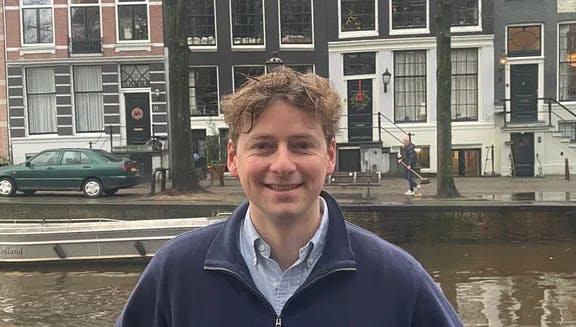#FoundersFridays: Meet Jurriaan Vollebregt

#FoundersFridays is a StartupAmsterdam interview series: for entrepreneurs, by entrepreneurs. Each hero answers questions on their entrepreneurial journey, their learnings, milestones and bottlenecks, as well as on Amsterdam and the Dutch startup scene. It’s a platform for entrepreneurs to speak their minds freely and pass on their learnings to anyone who’s thinking about founding a startup as well.
This week we spoke to Jurriaan Vollebregt, co-founder of Floepp, which has devised a new way to identify construction flaws in buildings and infrastructure at an early stage by cleverly linking different data points. Its IoT sensors can be attached to an object to measure various factors, collect data and identify potential issues through an algorithm.
How did your career journey lead you to founding Floepp?
As a child, I constantly shouted that I wanted to become a tycoon one day, without knowing what it meant. After my studies, the idea of working in a startup started to itch again. And a good friend asked me to join VSPARTICLE (a startup in Delft) as a software engineer. After two years of great fun, I knew it was time to get my own startup. I started up with no idea of what I was going to do. A promising startup begins with a problem, and so I talked to many people to find opportunities. After half a year, I had still not found a problem to solve, but I had found a cofounder: Peter Bontenbal. Together, we learned more and more about IoT; hence we started to test its possibilities. And we also found a good market to make it all worthwhile: the construction sector!
Why did you choose Amsterdam to start and grow your business?
After two years of commuting to Delft, working closer to home was a must – especially since Covid-19 started. Later, we found out that Amsterdam could be one of our biggest clients.
What’s the most valuable piece of advice you’ve been given?
During the startup period, I was accompanied by many mentors who fill in different questions and are important in different periods. The advice which I found pretty compelling is: you are the first person who will need to sell your product, and no one has ever sold this specific product before. Hence you will need to find out for yourself how it is sold best.
What’s a recent win you’re proud of?
The first time we could pay ourselves as a result of the hard work we had done, it felt great. People are quick to show an interest, but being paid for the things you do is really a different level.
What has been a recent challenge for your business, and what have you learned from it?
The combination of hardware and software is bound to cause errors. Isolation of parts will not show the combined mechanism. It’s possible that an error occurs only after an entire month of testing, or even longer. Thus, ensure you have a large quantity of tests running in all different scenarios to get as much out of testing as possible. However, this will be challenging and time-consuming, so take this into account when considering development, and be honest with your client about this.
Related articles

#FoundersFridays: Meet Alvise Sembenico

#FoundersFridays: Meet Layla Li

#FoundersFridays: Meet Svetlana Kordumova

#FoundersFridays: Meet Michael Musandu

#FoundersFridays: Meet Bibi Schmidt

#FoundersFridays: Meet Joris Oudejans

#FoundersFridays: Meet Peter-Paul de Leeuw

City data

#FoundersFridays: Meet Emily Huberts
